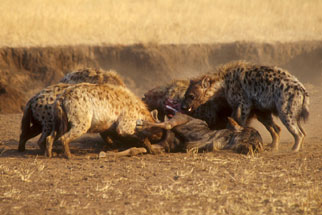The Perfect Hunter
- By David Levin
- Posted 08.05.10
- NOVA scienceNOW
Biologist Christine Drea from Duke University thinks that hyenas' remarkable social intelligence could be the key to their deadly hunting skills.
Transcript
The Perfect Hunter
Posted August 5, 2010
DAVID LEVIN: You're listening to a NOVA podcast. I'm David Levin.
What makes an animal species intelligent? Is it tool use? Complex communication? Well, intelligence is kind of a slippery beast, and it can be measured in a lot of different ways. Some things take more brain power than others. Especially things like hunting. Think about it: to be a successful hunter, you've got to be able to outsmart your prey. That's not always easy.
Biologist Christine Drea says there's a species of carnivore that does this better than almost any other. And it's not lions. It's not tigers. It's hyenas.
CHRISTINE DREA: I think hyenas have been very misrepresented. People tend to describe them as scavengers and skulky. But they're actually complex, social hunters that communicate with one another to coordinate their actions and bring down prey.
DAVID LEVIN: Drea studies hyena behavior. She says they've got a very specific kind of social intelligence, and it really shines in the way they hunt. One hyena alone can't kill a big prey, like a zebra...
CHRISTINE DREA: But you can catch a bigger, tougher prey if you do it in cahoots with another animal.
DAVID LEVIN: That means coordinating with others to form a hunting pack. It's something hyenas do all the time. Drea says that the amazing thing is that they don't just put their heads together once they come across something that looks like dinner. They decide what kind of prey they're going to hunt ahead of time, before they even see it—and then form a pack that's just the right size to actually get it.
CHRISTINE DREA: They would "know"—with little quotation marks around it—that zebras were around somewhere. But, it's not like these packs formed because they all saw zebra at the same time. They form their hunting parties before they go off to hunt their prey, and without the prey being around.
DAVID LEVIN: Drea says that the first person to notice this was Hans Kruuk. He's an ecologist.
CHRISTINE DREA: Yeah... he wrote a book called The Spotted Hyena.
DAVID LEVIN: It came out in the early '70s. And in that book, Kruuk described his experience of watching hyenas in the field. After waiting and watching for a long time, he started noticing a pattern in the way they'd hunt.
CHRISTINE DREA: And he noticed this kind of social sniffing, this excitement, this greeting behavior, that hyenas engage in. And, they come together, let's say, at the communal den and engage in this complex social behavior that involves a lot of olfactory communication and, perhaps, some groaning or contact calling. And then, they would go off in these hunting parties of about 10 individuals.
DAVID LEVIN: So Kruuk thought: maybe all that commotion had something to do with food...
CHRISTINE DREA: â¦that there was some kind of social communication happening between these animals, that they were entering some kind of agreement: "Let's go hunt zebra."
DAVID LEVIN: So Kruuk followed them on the hunt. And sure enough, whenever they formed a big group, they'd go after big prey.
CHRISTINE DREA: So somehow, the animals, when they figured out that they were going to go hunt zebra, they self-formed a party of 10. And, based on that behavior, Kruuk could say, "These animals are going off to hunt zebra," even though there were no zebra on the horizon.
DAVID LEVIN: After watching groups of hyenas for a long time, Kruuk found that he could actually predict what kind of prey they would kill just by counting the number of hyenas in each hunting pack.
CHRISTINE DREA: So, you know, there was predictive power in looking at their behavior and say, "This is what they're going after." And, they would bypass other prey on their way. So, it's not as if they were just hunting some random animal. They were targeting zebra. And, you could tell that way in advance.
DAVID LEVIN: In order to plan ahead like this, hyenas have to be able to communicate their intentions. They have to work as a team. And that takes special intelligence that Drea thinks some plant-eaters might not have.
CHRISTINE DREA: If you're sitting on a plate of lettuce, and that's what you eat, it's a little harder to argue that finding and getting food is all that challenging. But when your food is on the hoof, and is running away from you, that's already a situation that presents a challenge that a lot of vegetarians don't necessarily face.
DAVID LEVIN: For Drea, that combination of intelligence and power is part of the allure of studying hyenas.
CHRISTINE DREA: They have all the social complexities that primates have. So they have all of those subtleties of social interaction. When you're out in the African savannah, you hear them whooping and calling. And, you know they're communicating something. I remember being out there at night one time, saying, "Welcome to the food chain," because you definitely feel vulnerable. I mean, if you were going to design a lean, mean hunting machine, you'd design a hyena. They are the perfect hunter.
DAVID LEVIN: For NOVA, I'm David Levin.
Credits
Audio
- Produced by
- David Levin
- Interview by
- Susan K. Lewis
Image
- (hyenas)
- © Ricardo De Mattos
Related Links
-
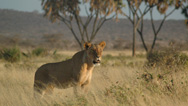
Coexisting with Carnivores
Around the world, humans are encroaching on wildlife, sparking deadly conflicts. But it doesn't have to be that way.
-
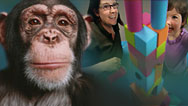
Ape Genius
Experts zero in on what separates humans from our closest living relatives.
-
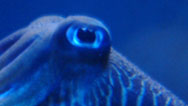
Spineless Smarts
Animal behaviorist Jean Boal ponders what cephalopods might teach us about our own intellect.
-
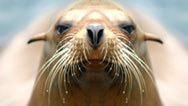
Smart Marine Mammals
Marine mammals are wowing researchers with more than just circus tricks.
You need the Flash Player plug-in to view this content.
